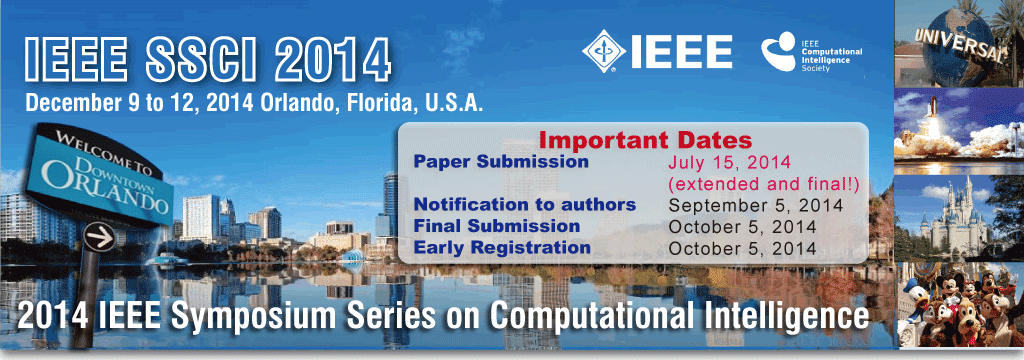- Home
- Final Submission Guidance
- Registration
- Program
- Presentation Guidelines
- Paper Submission
- Important Dates
- Organizing Committee
- Call for Special Sessions
- Call for Papers
- Plenary Speakers
- Keynote Speakers
- Special Sessions
- Doctoral Consortium
- Travel Grants
- Venue
- Accommodation
- Exhibitors
- Local Information
- Contact Us
2014 IEEE Workshop on Memetic Computing
(IEEE MC'2014)
December 9-12, 2014, Orlando, Florida, USA
Memetic Computing (MC) is one of the areas of Computational Intelligence which attracted the greatest interest in the last years. Inspired by Darwinian principles of natural evolution and Dawkins' concept of cultural evolution, MC has first emerged in the form of Memetic Algorithms (MAs), also known as hybrid Evolutionary Algorithms (EAs), Baldwinian/Lamarckian EAs, cultural algorithms or genetic local search algorithms. Whatever the name used, Memetic Algorithms have been traditionally identified as meta-heuristics combining a population-based global search framework with one or more (possibly domain-specific) local search methods. Thus, in a metaphorical parallel, natural evolution acting at gene level has been combined with cultural evolution, as performed by memes, i.e. learning units capable of local/individual refinements. Hence Memetic Algorithms captured in an elegant way the power of both biological selection and cultural selection, resulting in successful methodologies with a great balance between generality and problem-specificity.
Recently, however, the definition of MC has been extended way beyond the concept of Memetic Algorithms, perpetuating the idea of memes into concepts that capture the richness of a whole new generation of computational methodologies. In this novel, extended view, Memetic Computing encompasses different kinds of complex and dynamic algorithmic structures composed of multiple interacting modules (memes) whose harmonic coordination allows the solution of a problem.
According to this definition, various representations in the form of decision trees, artificial neural works, and fuzzy systems can be seen as examples of different manifestations of memetics. Taking a lead from the multi-faceted definitions and roles of the term "meme" in memetics, in the last two decades a plethora of potentially rich MC methodologies, frameworks and operational meme-inspired algorithms have been developed with considerable success in several real-world domains. Transcending the field of combinatorial and continuous optimization, the concept of "meme" dispersal and selection has thus been applied to a much broader scope, and exploited in fields like robotics, multi-agent systems, software engineering, and social sciences.
Despite the vast research on MC, and in the light of its wide definition, there remain many open issues and opportunities that are continually emerging as intriguing challenges for the field. The Workshop on Memetic Computing (MC) within SSCI 2014 is organized by IEEE CIS Emergent Technologies Task Force on Memetic Computing to serve as a platform for researchers to exchange the latest advances in theories, technologies, and applications of MC. The goal of the workshop is to reflect the latest advances in MC, to explore new concepts and emerging directions of memetics in Computational Intelligence, and to bring researchers from academia and industry together to raise the awareness on this effective technology. Specifically, we seek for diverse state-of-the-art concepts, theory, and real-world applications of MC.
Topics of interests
Authors are invited to submit their original and unpublished contributions in various areas of Memetic Computing, including (but not limited to) the following:
- Agent-based memetic computing
- Analytical and/or theoretical studies that enhance our understanding of memetic computing
- Applications of memetic frameworks in any domain
- Cognitive/brain inspired, individual/social learning inspired memetic computing
- Competitive, collaborative and cooperative memetic computing
- Formal and probabilistic memetic frameworks
- Knowledge incorporation in memetic computing
- Meme-gene coevolutionary frameworks and multi-inheritance model
- Memes, memeplexes, meta-memes in computing and high-order evolution
- Memetic frameworks for computationally expensive problems
- Memetic frameworks for single/multi-objective optimization
- Memetic frameworks using surrogate or approximation methods
- Novel concepts of memetic computing as applied to evolutionary computation and swarm intelligence
- Partial or full learning, meta-Lamarckian/Baldwinian learning, meta-learning
- Parallel memetic frameworks
Important Dates
| Deadline for Paper Submission | July 15, 2014 |
|---|---|
| Acceptance Notification | September 5, 2014 |
| Deadline for Camera-Ready Paper Submission | October 5, 2014 |
Symposium Co-Chairs
 |
Giovanni IaccaINCAS3 - Innovation Centre for Advanced Sensors and Sensor Systems9400 AT Assen, The NetherlandsEmail:giovanniiacca@incas3.eu |
|---|---|
 |
Fabio CaraffiniCentre for Computational Intelligence (CCI)School of Computer Science and InformaticsDe Montfort University, The GatewayLeicester LE1 9BH, United KingdomEmail: fabio.caraffini@email.dmu.ac.uk |
 |
Ferrante NeriCentre for Computational Intelligence (CCI)School of Computer Science and InformaticsDe Montfort University, The GatewayLeicester LE1 9BH, United KingdomEmail:fneri@dmu.ac.uk |
Technical Program Committee
- Anna V. Kononova (UK)
- Carlos Cotta (Spain)
- Chi Keong Goh (Singapore)
- Chuan-Kang Ting (Taiwan)
- Hisao Ishibuchi (Japan)
- Janos Botzheim (Japan)
- Jim Smith (UK)
- Lee Kee Khoon, Gary (Singapore)
- Meng-Hiot Lim (Singapore)
- Pablo Moscato (Australia)
- Ruhul A. Sarker (UK)
- Steven M. Gustafson (USA)
- Swagatam Das (India)
- Yew Soon Ong (Singapore)
- Ying-Ping Chen (Taiwan)
- Zexuan Zhu (China)
Top
Welcome to IEEE SSCI'14 in Orlando, Florida, December 9 to 12, 2014
Copyright © 2014 IEEE Symposium Series on Computational Intelligence
